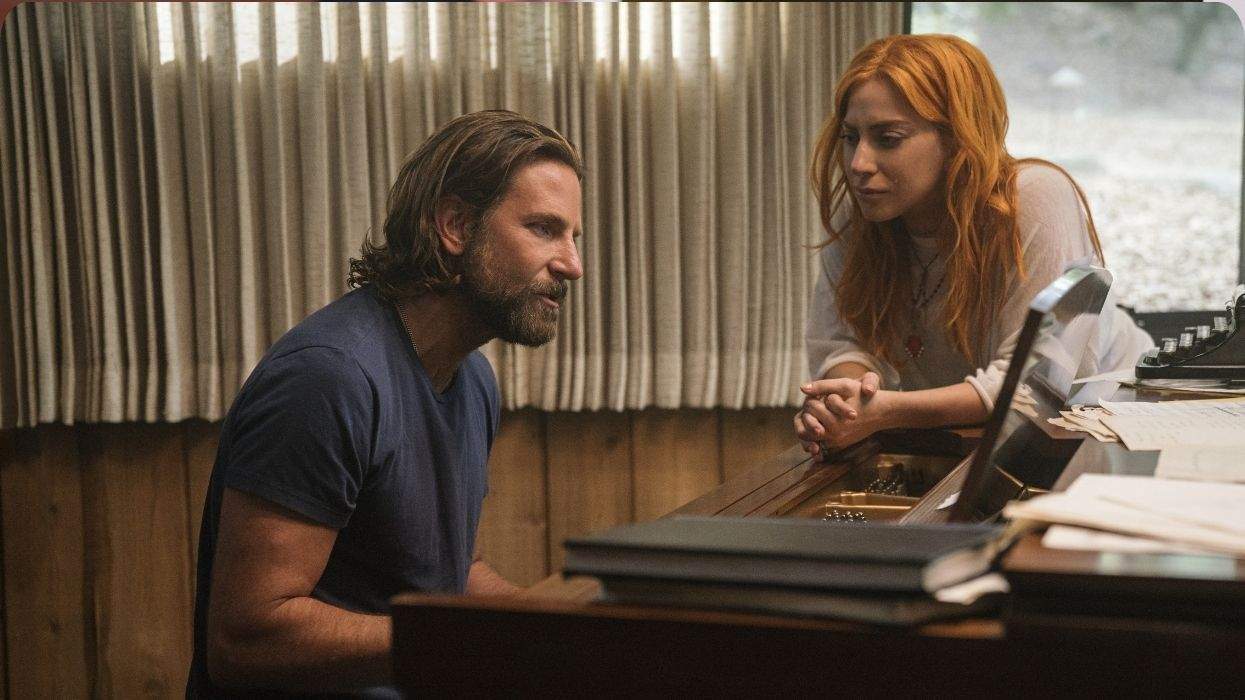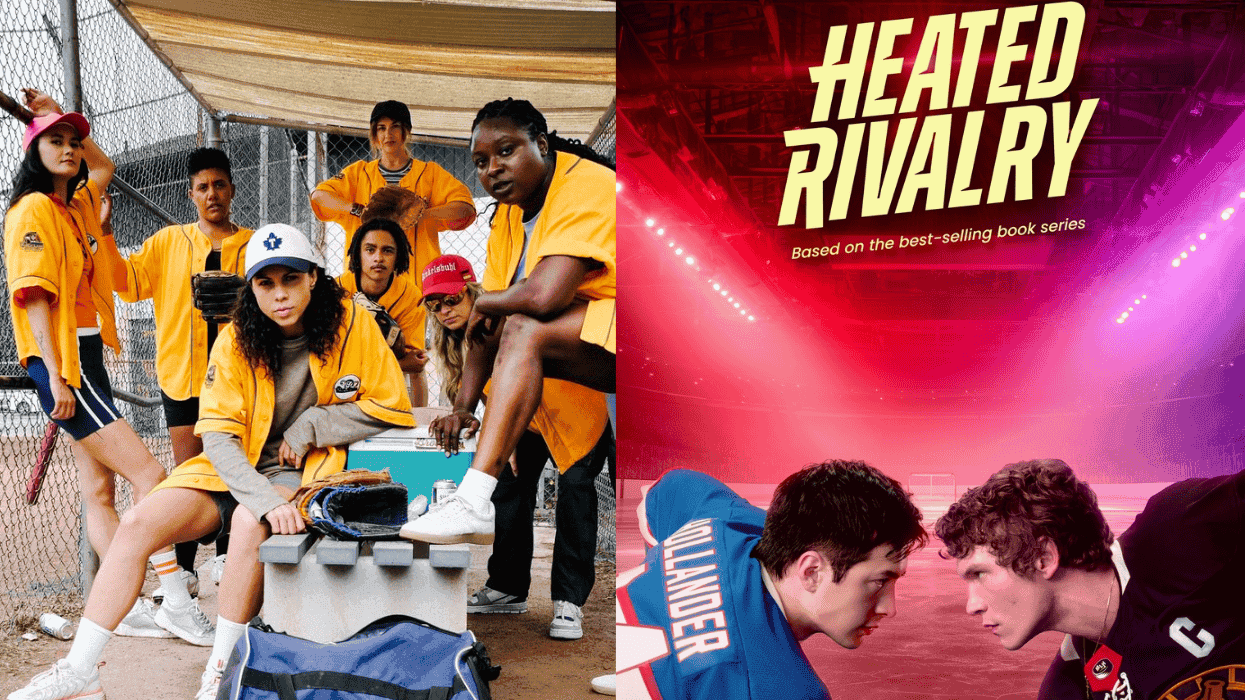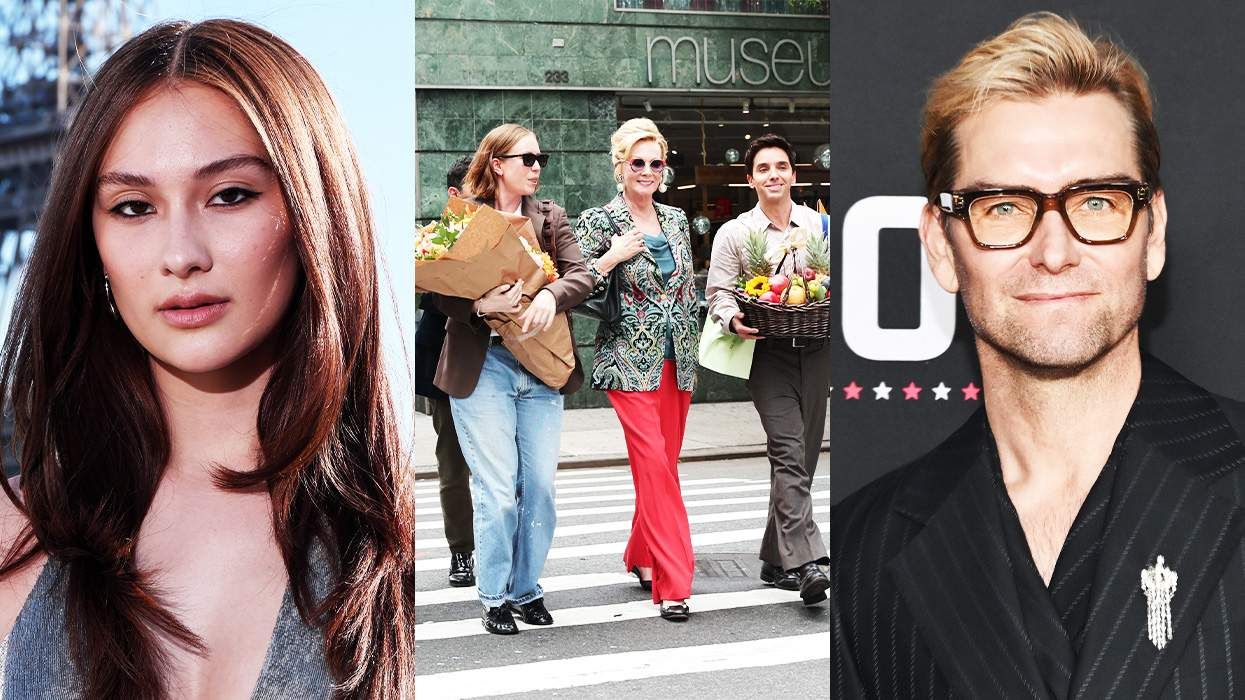Warning: WandaVision spoilers ahead.
In a recent episode of WandaVision, the magical Wanda Maximoff (Elizabeth Olsen) is engaging in a tense encounter with Monica Rambeau (Teyonah Parris) on the lawn of her suspiciously idyllic New Jersey home. The talk escalates into a CGI'ed superhero tussle as Wanda rejects Monica's warnings of threats coming from the mysterious government agency S.W.O.R.D. and crackles with red magic.
Wanda's nosy neighbor Agnes (Kathryn Hahn) peers at the impending Marvellian melee through her window, then casts several shades of a piercing look before storming away, the curtain fluttering behind her. At that moment, my partner and I, sitting on our couch watching the spectacle ourselves, burst into laughter. We rewound and replayed the scene of Agnes's reaction several times, with more giggles to follow. As a gay couple, we finally felt seen. We felt in on the joke.
Historically, we've never been the biggest fans of Marvel productions. Sure, some of the superhero men were eye candy, but they were overwhelmingly white, oppressively muscular, and straight. It took a decade for a woman, Captain Marvel (Brie Larson), to lead her own film. Beyond this lack of on-screen diversity, there also lacked a diversity of perspective. In nearly every production, the world (sometimes the universe!) was coming to end, stakes so high that it was hard to care. Beyond that, the films lacked a self-awareness of their self-seriousness that came off as humorless.
Then in breezed Agnes with her housewarming plant, brooch, and a quip for every occasion on the Disney+ series created by Jac Schaeffer. For those who have not seen WandaVision, the show, in addition to being a superhero production, is a love letter to different eras of American sitcoms. I Love Lucy, Bewitched, The Brady Bunch, Malcolm in the Middle, and Modern Family are among the inspirations and models for the episodes, each of which adopts respective plotlines, production techniques, and character tropes. Agnes adapted seamlessly to each iteration in costume and comportment, providing comic relief and an affectionate homage to these shows we've loved.
And then came the twist. Agnes, formerly a supporting character, was actually Agatha Harkness, a witch who had been pulling the strings behind Westview, which Wanda had originally commandeered with a magic spell meant to create a world, inspired by TV shows, where she didn't have to confront the realities of grief related to lost loved ones. Our standom reached new heights. Agatha "came out" as the villain in her own credit sequence, complete with an "Agatha All Along" jingle.
Further WandaVision revelations of Agatha's backstory made her more enticing. She was a witch! From 17th-century Salem! Who drained the life from her coven after she was penalized for magical overreach! With a rabbit named Senor Scratchy as a familiar!
My partner wondered if we were alone in our Agatha standom. But no, there was "Agatha All Along" soaring to the top of the iTunes and Billboard charts, surpassing Justin Bieber and the Weeknd. Make no mistake, it was queer fans who helped Agatha become the world's leading music star. But it wasn't just the song. Images of Agatha winking and holding the corpse of the dead pooch Sparky ("I killed Sparky too!" she cackled in her wicked reveal; she also, apparently, planned Puerto Vallarta's White Party) filled Instagram's gay meme aggregators.
I asked my own LGBTQ+ friends on Facebook why they loved Agatha. "Camp" was one of the major reasons. Agatha's perfect period ensembles and accessories -- the brooch, the leg warmers, the lobsters -- aligned perfectly with Susan Sontag's definition of camp as "a sensibility that revels in artifice, stylization, theatricalization, irony, playfulness, and exaggeration rather than content."
The incredible performance of Kathryn Hahn -- a gay icon in her own right from roles in Bad Moms and Transparent -- fleshes out this sensibility. Her face is a master class in emotional shifts, knowing nods, and sly winks to the audience watching the events transpiring in WandaVision. Her words also provide meta-commentary to the plot's ridiculousness. "Your accent comes and goes, doesn't it?" she tells Wanda, who is from a fictional Eastern European country. "Who are you? All those costumes and hairstyles!" She even references The Wizard of Oz, informing a temporarily disempowered Wanda, "You're magic's no good here."
There are many other references to the gay classic The Wizard of Oz in WandaVision, including the central journey of a heroine looking for self-discovery in a landscape that shifts from black-and-white to color. The revelation that Wanda too is a witch (the Scarlet Witch!) also parallels Glinda and the Wicked Witch of the West, and the dichotomy between good and evil. This line, however, is not so clear-cut. Wanda is villainized by the outside world for mind-controlling a town. "Don't let him make you the villain," Monica tells Wanda in the aforementioned scene, referring to the nefarious S.W.O.R.D. director, Tyler Hayward. "Maybe I already am," Wanda replies. Meanwhile, Agatha says to her coven mother, "Please, I can be good," before sucking the soul out of her. (Cue Wicked's "Defying Gravity.")
But witches and their portrayals in television and film have long been popular with queer people and other marginalized folks who have been the victims of witch hunts in history and the present day, confirms Michael Varrati, a director and writer who worked with The Boulet Brothers' Dragula. In pop culture, the connection is metaphorical.
"Witches eschew the status quo. They're against the norm and in fact draw power from being against the norm," Varrati says. "Combine that with diva worship that exists in gay culture already. You have this empowered woman who breaks the chains of the mainstream, her otherness makes her strong, and she's living deliciously ... and you have a perfect storm for a queer icon."
In the absence of protection from law and society, magic is also an attractive defense weapon, one Agatha refined over hundreds of years for survival. Her awe at Wanda having so much power but using it for comparatively small and selfish ends leads her to tell her, "Here you are, using it to make breakfast for dinner!" Anyone who has encountered straight people with untapped privilege can relate. The reality that Agnes devoted lifetimes of magical study compared with the gifted privilege of Wanda's powers -- indeed, most of the Avengers have unearned abilities or wealth -- adds further insult to injury.
Not all LGBTQ+ people are drawn to Agatha. One Facebook friend remarked that they were horrified by how Agatha treated her coven. It was Wanda and her struggle with grief after suffering the loss of her found family that resonated with them. Wanda also has her own coming-out story. Led by Agatha into scenes from her past, it is revealed that she was in fact "born this way" as a witch.
Wanda is likewise a compelling figure for this time in history when many of us wish we could create a fantastical world to escape the horrors of a global pandemic and the isolation it has imposed. Queer people are particularly susceptible to this feeling. "We can relate to sadness. We can relate to wanting to be someone we're not. We can relate to wishing our reality was a little different. We can relate to loss," Varrati says. "This show is really speaking to the personal, and I really think that's why people are being drawn to it."
But good- and bad-witch figures are also two sides of the same coin. Bewitched, another show beloved by LGBTQ+ TV viewers, centered on the tension between "the good witch," Samantha, who wanted to conform to the nonmagical world of suburban life, and her mother, "the bad witch" Endora (played by, in certainly no coincidence, Agnes Moorehead), who despised mortals and could not understand why her daughter would want to hide what makes her special. Like Wanda and Agnes, one represents "the draggy big heightened reality" that many queer people love and "the witch that we understand when living with the pressures of the real world," Varrati says. "You can't have one without the other. You can't live in a high fantasy ... [but] if you don't allow yourself a little fantasy, you're going to be miserable."
These worldviews also represent different factions of the LGBTQ+ community. In the early days of the movement, for example, the Mattachine Society preached conformity to attain mainstream acceptance, while the demonstrators at the Stonewall Inn saw visible queerness and revolution against oppressive structures as the path to independence. This divide over what it means to live as a queer person persists and can be found between the philosophy of these two witches.
Perhaps it is Agatha's ability to navigate both worlds that makes her appealing to so many LGBTQ+ people. She blends seamlessly into the fake heteronormative universe constructed from Wanda's imagination and siphoned sitcom history: the married white father and mother with two children whose never-too-serious problems are resolved by the end of the half hour. That's not to mention the extended Marvel Cinematic Universe, which has yet to introduce a gay superhero (although a same-sex couple in Eternals is reportedly forthcoming).
But Agatha also has the power to see the matrix, escape its mind control, and manipulate it to her own ends. She even breaks the fourth wall of WandaVision, looking directly at the camera and inviting viewers into the joke. For those who did not know her backstory in the comics, the reveal of her witchery was a real shocker: She may have looked like every other supporting character in Westview, but she was different from the others. In fact, hiding in plain sight, she was one of us all along.
DANIEL REYNOLDS is a senior editor at The Advocate. Follow him on Twitter @dnlreynolds. And don't miss the finale of WandaVision, streaming Friday on Disney+.















Charlie Kirk DID say stoning gay people was the 'perfect law' — and these other heinous quotes
These are some of his worst comments about LGBTQ+ people made by Charlie Kirk.